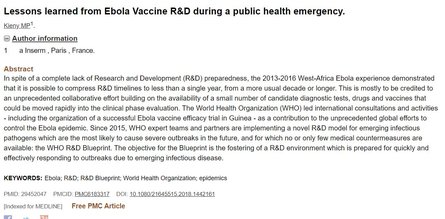
In spite of a complete lack of Research and Development (R&D) preparedness, the 2013-2016 West-Africa Ebola experience demonstrated that it is possible to compress R&D timelines to less than a single year, from a more usual decade or longer. This is mostly to be credited to an unprecedented collaborative effort building on the availability of a small number of candidate diagnostic tests, drugs and vaccines that could be moved rapidly into the clinical phase evaluation. The World Health Organization (WHO) led international consultations and activities - including the organization of a successful Ebola vaccine efficacy trial in Guinea - as a contribution to the unprecedented global efforts to control the Ebola epidemic. Since 2015, WHO expert teams and partners are implementing a novel R&D model for emerging infectious pathogens which are the most likely to cause severe outbreaks in the future, and for which no or only few medical countermeasures are available: the WHO R&D Blueprint. The objective for the Blueprint is the fostering of a R&D environment which is prepared for quickly and effectively responding to outbreaks due to emerging infectious disease.